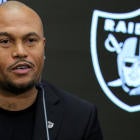As the SEC and Big 12 near a decision on the Champions Bowl site, the loser between the two finalists will likely have a cushy consolation prize – a spot in the college football playoff rotation.
But it’s tough to replace 70-plus years of SEC tradition with the Sugar Bowl, which could give New Orleans the edge over the Cotton Bowl in Dallas, according to two bowl officials.
| More Champions Bowl |
| Related links |
LSU played in its first Sugar Bowl in 1935, a 3-2 loss to TCU in Tulane Stadium. The SEC championship race has been tied to the Sugar Bowl the last 40 years. The Sugar Bowl also has 14 years of Bowl Championship Series experience.
Think about how big a deal last year’s championship game, stocked with two SEC teams, was to New Orleans. Some even suggest the SEC championship pairing helped reverse the BCS’ yearly inaction on forming a playoff.
The SEC is known as a loyal group, and with Mike Slive serving as a dean of commissioners, his handprints will all over this decision. Slive and SEC officials have been meeting with Big 12 commissioner Bob Bowlsby and his staff this month.
Helping matters is the Sugar Bowl’s financial reserve of what one bowl exec estimates at around $44 million. In terms of lump-sum guaranteed payouts, the Sugar can pull the Brinks truck to the curb tomorrow.
Sugar Bowl officials are staying relatively quiet entering the decision. President Paul Hoolahan was unavailable for comment this week.
Of course, there’s little doubt the Cotton and the space-aged Cowboys Stadium could put on a killer game – and produce plenty of revenue in the process.
As colleague Dennis Dodd points out, the Cotton Bowl already has been re-validated as a college football power thanks in part to the backing of Jerry’s World.
No longer handcuffed by the antiquated stadium at Texas’ Fair Park, the Cotton Bowl is poised to become a major player. It’s possible Dallas could one day host a national championship game and the Red River Rivalry in the same season.
The Superdome isn’t the shiny new toy but is still capable of hosting a quality bowl.
Steve Hogan, president of Florida Citrus Sports, which runs the Capital One Bowl and Russell Athletic Bowl, said both cities can make a good case.
“New Orleans is a good geographical spot for both conferences, and it’s an established situation, while Dallas has the unreal facilities,” Hogan said. “It’s certainly a decision the conferences will want to take their time on and get right.”
Then there’s the TV/sponsorship angle. While the Rose Bowl negotiated an ESPN deal worth an estimated $80 million annually, the Champions Bowl might match or surpass that total, even without the Rose’s tradition.
With leagues splitting the television money regardless, would the $1.2 billion Cowboys Stadium be a more attractive sell for sponsor revenue, which the leagues also split? The bowl host gets dibs on ticket sales.
Then again, if the Big 12 wants Dallas and the SEC wants New Orleans, it wouldn’t be a total shock if the SEC won out.




















